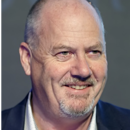(Is Moore’s Law coming to an end?) This is a joint event with the IET and BCS South Wales branch.
Watch the video
Presentation
Download the presentation slides (PDF)
Synopsis
Silicon ushered in the digital age during the last half of the twentieth century, but now a new generation of semiconductors is enabling a whole host of twenty-first century technologies.
Compound semiconductors offer significantly higher speed and performance than first generation silicon devices and also open new possibilities in sensing, machine vision and AI.
These advanced semiconductor materials are already playing a key role in commercialising quantum opportunities that will push the boundaries of what is possible today as we transform the digital world into a new quantum reality.
Q&A
By the end of the webinar we'd had almost enough time to answer the questions submitted through the webinar's Q&A feature, so our speaker has provided answers to the all the questions:
Q: Is parity an issue with qubits?
A: Quantum computing requires a complete paradigm shift when compared with digital 0s and 1s. As such, parity and error correction techniques need some rethinking but there is no reason why the same principles could not be applied. The more fundamental issue is one of qubit stability.
Q: Are there any significant rivals emerging to the south Wales cluster?
A: Evidence strongly suggests that what we have in South Wales is a unique, collaborative ecosystem that has been globally recognised for instance, through MITs Industrial Liaison Program (ILP). There is no comparable regional community that spans the technology readiness level scale from concept to large scale production of compound semiconductor technologies although we are in no doubt that efforts are being or will be made in other regions around the world to replicate and challenge what we have.
Q: Do you think the UK-ARPA will help in the group-funding?
A: Many of the industrial partners in the cluster have a significant global reach and have extensive experience in working with the US DARPA program. The UK has long been at the forefront of research and development in new technologies, we have for decades suffered from a lack of investment in further developing and commercialising those opportunities. The proposed Advanced Research & Invention Agency (ARIA) promises to promote investment in higher risk R&D activities with a clear vision to accelerate routes to market for new and emerging applications.
Q: Why does the UK have such a strong history of R&D, and such a poor one of exploitation?
A: Funding regimes have traditionally focused on research and development with little activity in industrial research and in promoting commercialisation and routes to markets for new discoveries and inventions. Some of this focus has resulted from state-aid regulations designed to prevent unfair subsidies resulting in unfair competition between member states. This issue has long been recognised and the EU has in recent years made efforts to encourage industrial research and the proposed UK-ARIA programme is part of the story in changing the balance in current funding activities.
Q: What is your best bet for when we'll start seeing production of domestic quantum computers?
A: As quoted at the beginning of my talk, American futurologist stated that we have a tendency to overestimate the impact of technology in the short term but to underestimate it in the long term. As a corollary to that, I would also add that we only truly recognise a new technology with hindsight as most new developments do not have a unique starting point but rather "creep up" on us through evolution. By way of example, driverless cars are already on their way as we have gradually accepted driver assistance in the form of automated braking systems, satellite navigation, self-parking, etc., which means the gap between fully manual and fully automated driving is closing over time. I believe the same will be true with quantum computing as we will see quantum technologies deployed in many areas from sensing to data encryption and only when we look back will we recognise when we really started using quantum. My best guess is that this is at least a decade or two away but quantum computing is of high national importance and there are likely to be many "secretive" projects underway that could start producing results sooner.
Q: Will compound semiconductors etc. continue to provide the doubling of computer speed/capability and halving the cost every 2 years that we have got used to?
A: Compound semiconductors have already directly extended the reach of many technologies including the adoption of 4G and 5G connectivity. The migration to new materials to enhance silicon is a natural progression in terms of speed and capability but also offers indirect routes to other advanced technologies such as optical and quantum computing that together will extend the reach of Moore's Law.
Q: Does Wales have the skill base to scale the cluster?
A: A key aim is to grow the cluster by encouraging new start-ups and attracting inward investment into the region. Skills capabilities is one of the first questions to be asked by potential newcomers to the region.
During the last few years the cluster's collaborative culture has been applied to developing a number of educational and skills programmes to attract new and existing students from school leavers through to post-doctoral activities. Whilst some work is still ongoing, activities include development of Apprenticeship opportunities, new BTEC course modules, graduate and post-graduate courses at Swansea and Cardiff Universities including two new MSc courses and a Centre for Doctoral Training in Compound Semiconductors launched through Cardiff University.
Feedback
'This is the best presentation I have attended in a long time. Simply brilliant.'
'I agree. Loved the presentation. Very informative! Thank you!'
About the speaker
Chris is a Director of CS Connected Ltd, representing the world’s first compound semiconductor cluster that is rapidly evolving across South Wales and the West of England.
Our events are for adults aged 16 years and over.
This event is brought to you by: BCS South Wales branch and the IET















